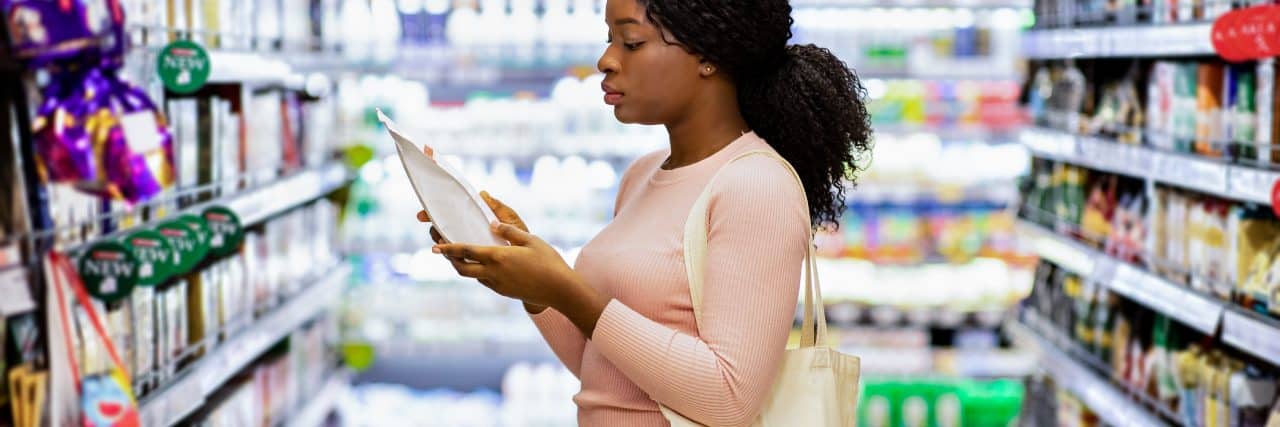7 Grocery Shopping Tips For When Depression Makes Eating Hard
Editor's Note
If you live with an eating disorder, the following post could be potentially triggering. You can contact the Crisis Text Line by texting “NEDA” to 741741.
I don’t know about you, but when my depression hits, my appetite completely disappears. My favorite foods don’t sound appetizing and there’s no way I can be expected to commit to three meals a day. However, I still do have to eat, meaning I have to go grocery shopping. Grocery shopping when you’re unsure of what you want to cook is hard. Doing it when you have no idea if you can stomach food, or when you’ll be able to, feels impossible.
I’ve had to do this more times than I can count, and it’s because of that I’ve learned some grocery tips and tricks for when depression makes eating hard.
1. If you have comfort or safe foods, stock up.
This is a double-edged sword, only because you don’t want to get sick of them. That defeats the whole purpose. Sometimes, even in the worst bouts of depression, I won’t want to eat, but my comfort foods will entice me because the focus is comfort versus eating to eat. Sure, it may not always be the healthiest (chocolate is my go-to) but at the end of the day, eating is eating regardless. So stock up on those comfort foods or foods that your brain won’t struggle to eat.
2. Try to pick up non-perishables that are easy on the stomach.
The last thing you want is something that is going to expire within days. The longer the expiration date, the better. That, or if it’s freezable, you can still get your money’s worth. Powdered mashed potatoes, soups, and foods like that are good. Bonus tip: Smaller portions are your friend. I know when I am depressed I can get very overwhelmed by seeing a lot of food on my plate. Smaller portions will help make it easier for you.
3. Use the buddy system.
When I’m depressed, I don’t think clearly. Sometimes having another person with me when I’m grocery shopping helps because they’ll think of things I haven’t thought of. Their job is to ask questions, and maybe even take over if you start getting overwhelmed. Let them handle putting things in the cart, and just give them a “yes” or “no.”
4. Go in with a plan.
This is important. When I’m healthy, I love meandering through the grocery store. However, when I’m not, it becomes too much for me to process because instead of seeing possibilities, all I see is extra work. If you’re able to create a list, meal plan, or some kind of structure to make the trip more efficient, that’ll help.
5. This sounds silly, but dress comfortably.
Grocery shopping when you’re depressed is already a lot to handle. Don’t be afraid to legitimately show up as you are. No one is going to judge you for how you look in a Publix or ShopRite. For me, that looks like a hoodie and some workout leggings. For you, that may look different. People underestimate the power of what we wear when we’re doing things that make us uncomfortable or that are hard to do, so don’t overdo it.
6. Focus more on snacks than meals.
OK, I’m no dietician. I’m just a person with depression who still has to eat because they’re human. Depending on the severity of my depression, I’ve gone so long without eating properly or enough that I get sick eating proper meals when I start feeling better. This is something people with eating disorders may be more familiar with (i.e., refeeding syndrome). I mentioned above smaller portions are helpful but keep in mind that sometimes you have to think small, and that means snacks. Cheese sticks, Doritos, and clementines never last long when I’m depressed.
7. Accessibility comes first.
This goes hand in hand with snacks over meals, but this means picking food that doesn’t require you to think. I also live with attention-deficit/hyperactivity disorder (ADHD) so I live to eat foods that require very little preparation. It’s just an extra step that can convince me to skip a meal. Grab-and-go, television meals, etc., are great. Don’t make things harder. Make them easy and simple.
At the end of the day, eating with depression can be a struggle, and can even be a form of disordered eating itself, but what we need to remember is that we aren’t alone, help is available, and you don’t have to do things any specific way. You just need to do what works for you when you’re simply trying to survive.
You got this. We believe in you.
Getty image by Prostock-Studio

